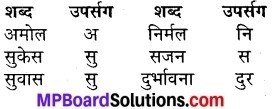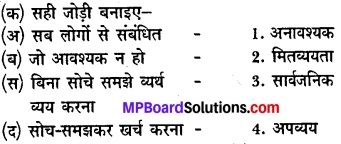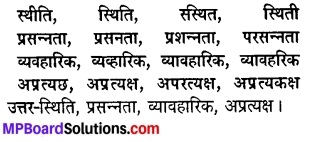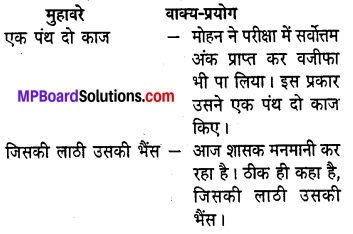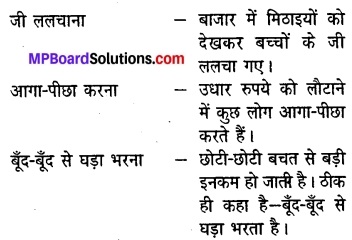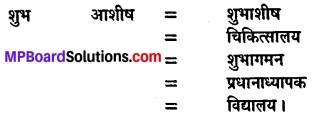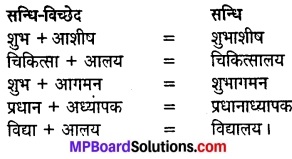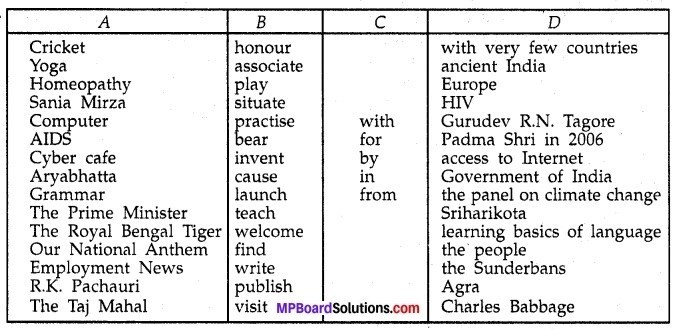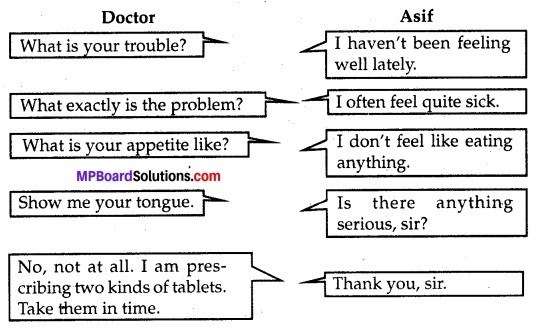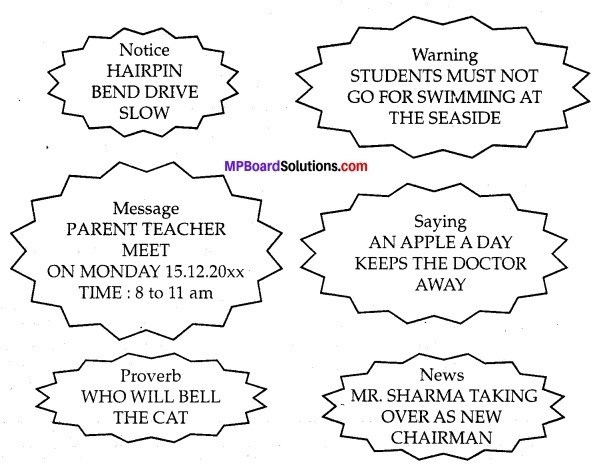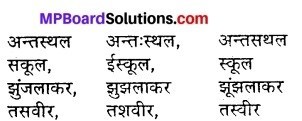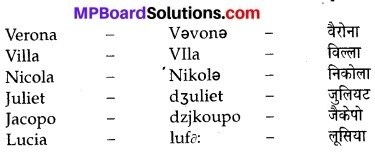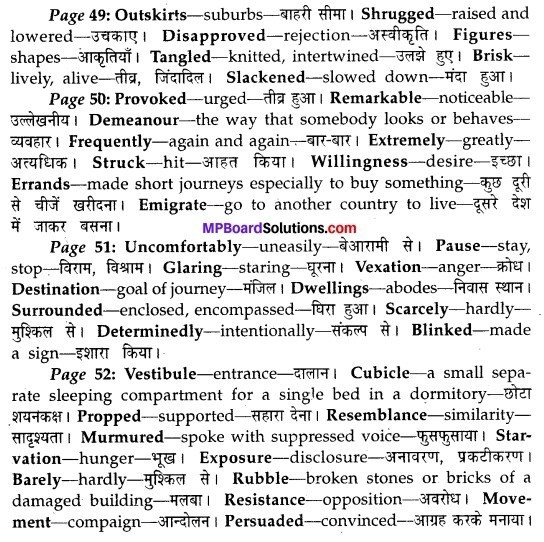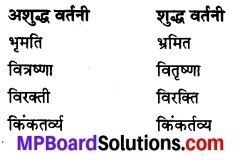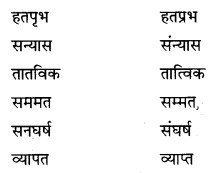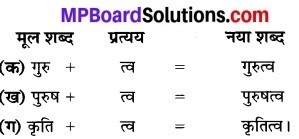MP Board Class 7th Hindi Sugam Bharti Solutions Chapter 14 गोपी
MP Board Class 7th Hindi Sugam Bharti Chapter 14 प्रश्न-अभ्यास
वस्तुनिष्ठ प्रश्न
Mp Board Class 7th Hindi Chapter 14 प्रश्न 1.
(क) सही जोड़ी बनाइए
1. निमंत्रण = (क) संस्था
2. गुलाबी = (ख) पलकें
3. शिक्षण = (ग) पत्र
4. भीगी = (घ) लिफाफा
उत्तर
1. (ग), 2. (घ), 3. (क), 4. (घ)
Mp Board Solution Class 7 प्रश्न (ख)
दिए गए शब्दों से उपयुक्त विकल्प चुनकर रिक्त स्थानों की पूर्ति कीजिए
1. बीस वर्ष से वह ………………….. कक्षाएँ पढ़ा रही थी। (ग्यारहवीं/बारहवीं)
2. पिता, गाँवों में ………………….. का काम करते थे। (चिनोई पुताई)
3. गोपी तो जैसे प्यार का ….. खजाना पा गया था। (अनमोल/विशाल)
4. पिछले पाँच वर्षों से वे …. से पीड़ित थे। …….. (कैंसर/क्षय)
उत्तर
1. बारहवीं
2. चिनाई
3. विशाल
4. क्षय
MP Board Class 7th Hindi Sugam Bharti Chapter 14 अति लघु उत्तरीय प्रश्न
Mp Board Class 7th Hindi प्रश्न 2.
निम्नलिखित प्रश्नों के एक-एक वाक्य में उत्तर दीजिए
(क)
गोपी कक्षा में कहाँ बैठता था?
उत्तर
गोपी कक्षा में सबसे पीछे कोने वाली सीट पर बैठता था।
(ख)
शिल्पा से गोपी का कौन-सा रिश्ता था?
उत्तर
गोपी शिल्पा को अपनी बड़ी बहन की तरह मानता था।
(ग)
कक्षा के अन्य छात्रों ने गोपी की मदद किस प्रकार की?
उत्तर
कक्षा के छात्रों ने गोपी की आर्थिक मदद के साथ उसे प्यार और सांत्वना प्रदान की।
(घ)
गोपी की माँ क्या काम करती थी?
उत्तर
गोपी की मां सड़क पर पत्थर तोड़ती थी।
MP Board Class 7th Hindi Sugam Bharti Chapter 14 लघु उत्तरीय प्रश्न
Gopi Chaprasi Question Answer MP Board प्रश्न 3.
निम्नलिखित प्रश्नों के तीन से पाँच वाक्यों में उत्तर लिखिए
(क)
गोपी स्कूल देर से क्यों आता था?
उत्तर
गोपी सुबह देर से इसलिए आता था क्योंकि सुबह सात बजे से लेकर एक बजे तक वह मजदूरी करता रहता। एक साहब के बगीचे में पानी देता और दस घरों में दूध की थैलियों औरा बाजार का सामान लाकर देता।
(ख)
शिल्पा गोपी को देखकर क्यों चिढ़ जाती थी?
उत्तर
गोपी रबर के टायर वाली चप्पले पहनता। स्कूल पोशाक की सफेद कमीज बिना ठीक धुले, बिना प्रेस लगे एकदम पीली और चमड़े जैसी गुडीमुड़ी रहती थी। नाखून गंदे होते थे। उसके नहाने पर भी संदेह होता था। इसलिए शिल्पा उससे चिढ़ जाती थी।
(ग)
‘जिंदगी कितनी कठोर और निर्मम होती है।’ इस पंक्ति का आशय स्पष्ट कीजिए। .
उत्तर
जब गोपी ने अपनी समस्त समस्याएँ जैसे पिता का गुजरना, मेहनत-मजदूरी करना, सुबह से एक बजे तक छोटा-मोटा काम करना आदि शिल्पा को बताई, यह सब सुनकर शिल्पा का मन हाहाकार से भर उठा था। वाकई जिंदगी कितनी कठोर और निर्मम होती है।
(घ)
गोपी ने अपनी मंजिल किस प्रकार पाई?
उत्तर
भाग्य की बात है कि गोपी के पिता की तेरहवीं ‘ वाले दिन स्कूल में कुछ समारोह था। आधे दिन का
अवकाश था। पता लगा कि पूरी कक्षा गोपी के घर पहुँच गई। हाथों हाथ सारा सामान दिला दिया। खाना-पिना, पूजा हवन सभी कराकर और शेष रुपए गोपी की माँ को देकर बालक लौटे।
(ङ)
शिल्पा को कठोर और ममतामयी क्यों कहा गयाहै?
उत्तर
शिल्पा कठोर इसलिए थी क्योंकि कक्षा में प्रत्येक क्षेत्र जैसे-शिक्षा, कपड़े आदि में अनुशासनप्रिय थी परंतु जब उसने गोपी की निर्धनता और व्यथा सुनी तो दयाभाव तथा ममताभयी होकर गोपी का पूरा साथ दिया।
Mp Board Class 7th Subject Hindi प्रश्न 4.
निम्नलिखित शब्दों के शुद्ध उच्चारण कीजिएहृदय, शिक्षण, ट्रेनिंग, स्वच्छ, अनुशासित, विश्वास ।
उत्तर
छात्र स्वयं करें।
Gopi Ne Apni Manzil Kaise Prapt Ki MP Board प्रश्न 5.
निम्नलिखित शब्दों की वर्तनी शुद्ध कीजिए।
सेष, निरमम, कालाश, निभंतरण, संघर्शों
उत्तर
शब्द = शुद्ध वर्तनी
सेप = शेष
निर्मम = निरमम
कांलाश = कालांश
निमंतरण = निमंत्रण
संघर्टी = संघर्षों
Mp Board Class 7th Hindi Chapter 2 प्रश्न 6.
‘बंदर’ शब्द पुल्लिंग है। इसमें ‘इया’ प्रत्य जोड़ने से स्त्रीलिंग शब्द ‘बंदरिया’ बनता है। इसी प्रकार निम्नलिखित शब्दों में ‘इया’ प्रत्यय जोड़कर स्त्रीलिंग शब्द बनाइए।
गुड्डा, बूढ़ा, बेटा, लोटा, बछड़ा
उत्तर
(क) गुड्डा = गुड़िया
(ख) बूढ़ा = बुढ़िया
(ग) बेटा = बेटियां
(घ) लोटा = लुटियां
(ङ) बछड़ा = बछड़ियां
Mp Board Solution Class 7 Hindi प्रश्न 7.
निम्नलिखित शब्दों के तत्सम रूप लिखिए
बात, आठ, आधा, काम, घर, पिता, गाँव, पाँच, चमड़ा
उत्तर
तद्भव = तत्सम
बात = वार्ता
आठ = अष्ट
आधा = अर्ध
काम = कार्य
घर = गुह
पिता= पितृ
गगाँ = व्राम
पाँच = पंचम
चमड़ा = चर्म
Sugam Bharti Class 7 MP Board प्रश्न 8.
निम्नलिखित विलोम युग्म शब्दों का उदाहरणनुसार वाक्यों में प्रयोग कीजिए।
उदाहरण : राम की सुग्रीव से मित्रता थी तो रावण से शत्रुता।
कठोर-कोमल, गरीब-अमीर, सुबह-शाम, उपस्थित-अनुपस्थित, उत्तीर्ण-अनुत्तीर्ण पूर्व के अध्याय में आप वचन पढ़ चुके हैं। इसके साथ ही इन्हें भी समझिए
उत्तर
- कठोर-कोमल-नारियल जितना ऊपर से कठोर है उतना ही अंदर से कोमल होता है।
- गरीब-अमीर-समाज में बड़ा वर्ग गरीब का तथा छोटा वर्ग अमीर का होता है।
- सुबह-शाम-हर शाम पश्चात सुबह जरुर आती
- उपस्थित-अनुपस्थित-सारे बच्चे समय पर उपस्थित थे परंतु गोपी अनुपस्थित था।
- उत्तीर्ण-उनुत्तीर्ण-एक बच्चा अनुत्तीर्ण है बाकि – सारे उत्तीर्ण हैं।
Mp Board Class 7 Hindi प्रश्न 9.
नीचे लिखे वाक्यों में वचन की अशुद्धियां हैं, उन्हें दूर करके वाक्य पुनः लिखिए।
(क) साइकिल के पहिए पंक्चर हो गया।
(ख) शिवा ने पाँच केले खरीदा।
(ग) पंडित जी पूजाएँ करवाई।
(घ) आज बहुत तेज वर्षाएँ हो रही हैं।
(ङ) मानसी की माताजी बाजार से आई है।
उत्तर
(क) साइकिल के पहिए पंक्चर हो गए।
(ख) शिवा ने पाँच केले खरीदे।
(ग) पंडित जी ने पूजा करवाईं।
(घ) आज बहुत तेज वर्षा हो रही है।
(ङ) मानसी की माताजी बाजार से आई है।
गोपी पाठ का परिचय
प्रस्तुत पाठ एक भावनाप्रद एवं शिक्षाप्रद रचना है जिसमें शिल्पा एक आध्यापिका है जो लंबी यात्रा से लौटी है, वह एक गुलाबी पत्र पढ़ती है जिसे उसके पूर्व छात्र गोपी ने लिखा था। गोपी बताता है कि अपार संघर्ष के बाद उसने छोटे भाई को पढ़ाया तथा नौकरी लगवाई। स्वयं भी कार्यरत है। पिता की मृत्यु तो पहले ही हो चुकी थी। माँ भी चल बसी थी। गोपी अपने विवाह में आने के लिए शिल्पा दीदी से आग्रह कर रहा था। पत्र पढ़कर शिल्पा भूतकाल में खो गई। उसे याद है गोपी एक गंदा और मैले-कुचैले कपड़े पहनकर आता था। वह मना करने के बावजूद टायर से बनी चप्पले पहनता था। वह रोज देर से आता था। प्रार्थना सभा में तो कभी जा ही नहीं पाता था। ऐसा शायद ही कोई दिन होता था जब गोपी को डांट नहीं पड़ती थी। ऐसे में शिल्पा दीदी गोपी से चिढ़ी-चिढ़ी-सी रहने लगी। थी। एक बार तो गोपी ने आठ-दस दिन की छुट्टी ही कर ली। जब – वापस आया तो टोपी पहन कर कक्षा में आया। सारे बच्चे हैंसने लगे। उसके कपड़े अभी भी गंदे थे। शिल्पा
दीदी ने आव देखा न ताव और गुस्से में उसके चाँटा जड़ दिया। वह उसे कुछ-कुछ कहने लगी। और पूछा कि यह टोपी का क्या चक्कर है? गोपी ने रोते हुए बताया कि उसके पिता गुजर गए है। और उसे अपने छोटे भाई-बहन के लिए सुबह काम करना पड़ता है, इसीलिए उसे देर हो जाती है। उसकी कहानी सुनकर दीदी उससे माफी माँगने लगती है। शिल्पा दीदी और कक्षा के बच्चों ने गोपली के लिए बहुत धन एकत्रित किया। इस तरह से गोपी का भविष्य सुधरा इसके बाद शिल्पा ने गोपी लिखते हुए कहा कि वह अवश्य उसकी शादी में आएगी।
गोपी संदर्भ-प्रसंग सहित व्याख्या
1. उनकी कक्षा ……..पूरा-पूरा अधिकार था।
शब्दार्थ- खीज = नफरत; ऊब = निरूत्साह ।
संदर्भ-पूर्ववत्।
प्रसंग-इसमें दीदी की गोपी के लिए खीज दिखाई गई है।
व्याख्या
गोपी प्रायः सबसे पीछे की कोने वाली सीट पर बैठता था। कई बार मना करने के बावजूद वह टायर से बनी चप्पलें पहनता था। विद्यालय की ड्रेस सिकुड़ी और गंदी होती थी। बालों में तेल नहीं, नखून बिना कटे रहते थे। दीदी को संदेह रहता था कि चूकि वह द्वितीय श्रेणी में दसवीं पास करके आया है, इसलिए उसे पढ़ने का अधिकार था।
विशेष-गोपी की दयनीय स्थिति को प्रकट किया गया है।
2. ‘माँ कहाँ से………खजाना पा गया था। (प्र. 82)
शब्दार्थ-पोशाकें = कपड़े; निर्मम = जिसमें दया न हो।
संदर्भ-पूर्ववत्
प्रसंग-इसमें गोपी अपनी परेशानी बताता है।
व्याख्या
गोपी बताता है कि चमड़े के जूते और दो जोड़ी स्कूल के कपड़े लाना माँ के बस की बात नहीं थी। एक सस्ती टिक्की महीने भर चलानी होती है। एक वक्त की रोटी मिलती है। तेल का क्या पता, नाखून कब काटना और नहाना कब, कुछ पता नहीं होता। हव सात बजे से स्कूल आने तक मजदूरी करता है। दस घरों में दूध की थैलियाँ और बाजार का सामान लाकर देता। विता भी बिमारी के चलते चल बसे। दीदी, नाम मत काटिए। आपके घर का काम कर दिया करूँगा। यह वर्ष निकल जाए तो कुछ बन जाऊँगा। परसों पिता की तेरहवीं है। घर में कुछ नहीं है। एक टूटी हुई घड़ी बेचकर कुछ सामान लाया हूँ। मुझे क्षमा कर दे। गोपी की व्यथा सुनकर शिल्पा का मन आसुँओं में डूब गया। उसने स्वयं गोपी से क्षमा मांगी। अगले दिन शिल्पा ने तथ समस्त कक्षा के साथियों ने गोपी की आर्थिक सहायता तो की ही तथा उसे प्यार, सांत्वना और तसल्ली दी।
